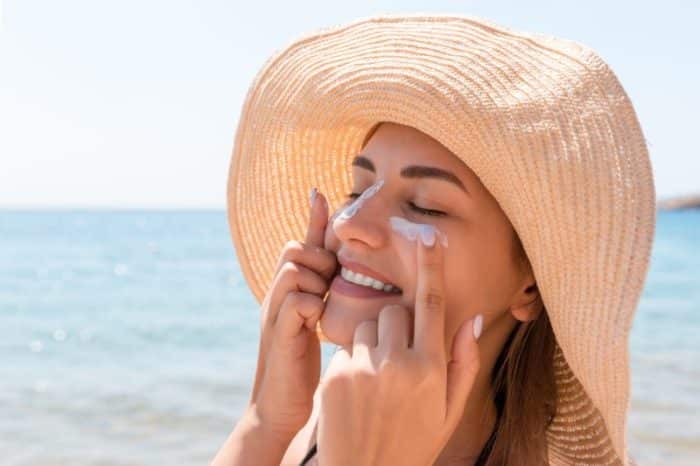Sunscreen is often viewed as a summer essential, but its role in daily skincare goes far beyond protecting against sunburn. Long-term exposure to ultraviolet (UV) radiation from the sun accelerates skin Aging, causing wrinkles, fine lines, pigmentation, and texture changes. Including sunscreen in your daily skincare routine can significantly reduce these effects.
This article explores the 5 anti-Aging benefits of using sunscreen daily and how consistent application can contribute to healthier, more resilient skin over time.
Why Daily Sunscreen Use Matters
Sun exposure is the leading external factor in premature skin Aging, also known as photoaging. Even incidental exposure like walking to the car or sitting near a window—can contribute to cumulative UV damage. Sunscreens act as a protective barrier, absorbing or reflecting harmful UV rays before they penetrate the skin and cause damage to deeper layers.
Incorporating sunscreen into your morning routine is one of the most effective ways to maintain skin health and prevent premature signs of Aging.

1. Reduces the Formation of Fine Lines and Wrinkles
UV Radiation and Collagen Breakdown
One of the primary anti-Aging benefits of using sunscreen daily is the prevention of fine lines and wrinkles. Ultraviolet rays, particularly UVA rays, penetrate the skin deeply and damage collagen and elastin fibers. These are proteins that maintain the skin’s firmness and elasticity.
Over time, this damage leads to sagging, loss of structure, and the appearance of lines around the eyes, mouth, and forehead. By protecting the skin from UV radiation, sunscreen helps preserve these structural proteins, keeping the skin smoother and more youthful-looking for longer.
Consistency Is Key
Applying sunscreen occasionally won’t have the same effect. Daily use ensures ongoing protection and reduces the risk of collagen degradation, making it a long-term strategy to prevent early Aging signs.
2. Prevents Hyperpigmentation and Uneven Skin Tone
Sun Exposure and Melanin Production
Hyperpigmentation, including sun spots and melasma, is another common sign of Aging exacerbated by sun exposure. UV radiation stimulates melanin production in the skin, which can lead to patches of discoloration that become more noticeable with age.
Daily sunscreen application minimizes UV-triggered melanin activity, helping to maintain an even skin tone and reducing the development of dark spots over time.
Post-Treatment Skin Care
For individuals undergoing treatments like chemical peels or laser therapy, sun exposure can worsen pigmentation. Daily sunscreen use protects the treated skin from further damage and ensures better healing and more consistent results.
3. Preserves Skin Texture and Elasticity
UV Damage Alters Skin Structure
Extended UV exposure can lead to a rough, uneven skin texture. The breakdown of collagen and the increase in oxidative stress contribute to the formation of a leathery appearance or areas of thickened, dry skin.
Using sunscreen daily helps the skin retain its natural moisture barrier and prevents the formation of UV-induced rough patches. Over time, this supports a smoother, softer skin texture and reduces visible signs of Aging.
Sunscreen as Preventive Skincare
Rather than correcting skin damage later, daily sunscreen acts as a preventive solution that supports the skin’s natural functions and appearance. This not only delays Aging but also reduces the need for intensive corrective procedures.
4. Lowers the Risk of Broken Capillaries and Redness
Inflammation and Vascular Damage
Chronic UV exposure can cause inflammation and damage to the skin’s microvascular network, especially in fair or sensitive skin types. This can lead to permanent redness, broken capillaries (especially on the nose and cheeks), and increased skin sensitivity—all of which contribute to an aged appearance.
Sunscreen protects the delicate blood vessels beneath the skin’s surface, minimizing inflammation and preserving an even skin tone.
Less Sensitivity Over Time
Individuals with rosacea or sensitive skin often notice reduced flare-ups and redness when sunscreen is used regularly. This improved skin resilience is another anti-Aging benefit, as chronic inflammation accelerates the Aging process.
5. Reduces the Risk of Skin Cancer, Which Can Lead to Scarring and Skin Damage
Skin Cancer and Cosmetic Consequences
Although not typically categorized under Aging, skin cancer treatment can result in surgical scars, changes in skin texture, and pigmentation—especially when lesions are located on visible areas like the face or hands. Daily use of sunscreen reduces the risk of developing skin cancers such as basal cell carcinoma, squamous cell carcinoma, and melanoma.
Prevention Is Simpler Than Treatment
By reducing the likelihood of UV-induced skin damage, daily sunscreen helps maintain clear, even-toned skin while also preventing long-term issues that could alter the skin’s appearance permanently.
Choosing the Right Sunscreen for Daily Use
Broad-Spectrum Formulas
When selecting a sunscreen for daily use, opt for a broad-spectrum formula that protects against both UVA and UVB rays. UVA rays are primarily responsible for Aging, while UVB rays cause sunburn and can also contribute to skin cancer.
SPF Level and Reapplication
For everyday wear, an SPF of 30 or higher is recommended. If you are outdoors for extended periods, sweating, or swimming, reapplication every two hours is essential. For indoor days or overcast weather, a single morning application of a daily moisturizer with SPF may suffice.
Suitable for All Skin Types
Modern formulations include sunscreens for various skin types, including dry, oily, acne-prone, or sensitive skin. Lightweight gel-based or mineral-based options are often preferred for daily wear as they blend well with other skincare or makeup products.
Tips for Making Sunscreen a Daily Habit
- Apply as the final step in your morning skincare routine.
- Use about a quarter teaspoon for your face and neck.
- Don’t forget the ears, eyelids, lips, and back of the hands.
- Reapply during the day if you spend time outdoors.
- Choose products that are labeled for daily use or lightweight texture.
Building the habit of applying sunscreen every day ensures you’re consistently protected from the cumulative effects of sun exposure, ultimately supporting younger-looking skin over time.
Conclusion:
The anti-Aging benefits of using sunscreen daily from reducing wrinkles and hyperpigmentation to preserving skin texture and preventing vascular damage demonstrate that sun protection is not just seasonal. It is a year-round, proactive step in any skincare routine aimed at maintaining healthy, youthful skin.
While other skincare products may target existing issues, sunscreen is one of the few that actively prevents them. It supports the skin’s natural structure, slows the visible effects of time, and contributes to overall skin health.
By integrating sunscreen into your daily regimen, you’re not only protecting your skin from immediate damage but also investing in its long-term resilience and appearance.

